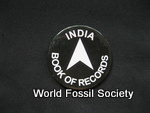If you thought the largest dinosaurs to have walked the Earth produced the biggest eggs, you’d be mistaken. Scientists have discovered that both individual egg size and clutch size for the sauropods — which includes Diplodocus — were a lot smaller than might be expected for such enormous creatures. A team of scientists have suggested […]
Archive for June, 2014
A New Basal Hadrosauroid Dinosaur (Dinosauria: Ornithopoda) with Transitional Features from the Late Cretaceous of Henan Province, China
 June 29th, 2014
June 29th, 2014  Riffin
Riffin Southwestern Henan Province in central China contains many down-faulted basins, including the Xixia Basin where the Upper Cretaceous continental sediments are well exposed. The Majiacun Formation is a major dinosaur-bearing stratigraphic unit that occurs in this basin. Methodology/Principal Findings A new basal hadrosauroid dinosaur, Zhanghenglong yangchengensis gen. et sp. nov., is named based on newly […]
Study sheds light on how one of Earth’s oldest reefs was formed
 June 27th, 2014
June 27th, 2014  Riffin
Riffin It is a remarkable survivor of an ancient aquatic world — now a new study sheds light on how one of Earth’s oldest reefs was formed. Researchers have discovered that one of these reefs — now located on dry land in Namibia — was built almost 550 million years ago, by the first animals to […]
Plate tectonics : movement of plates explained by scientists
 June 26th, 2014
June 26th, 2014  Riffin
Riffin A team of researchers including Scripps Institution of Oceanography, UC San Diego geophysicist Dave Stegman has developed a new theory to explain the global motions of tectonic plates on the earth’s surface. The new theory extends the theory of plate tectonics — a kinematic description of plate motion without reference to the forces behind it […]
Frictional melting help predict volcanic eruption behavior
 June 25th, 2014
June 25th, 2014  Riffin
Riffin A new discovery in the study of how lava dome volcanoes erupt may help in the development of methods to predict how a volcanic eruption will behave, say scientists at the University of Liverpool. Volcanologists at the University have discovered that a process called frictional melting plays a role in determining how a volcano will […]
Study of ESA shows Earth’s changing magnetism
 June 24th, 2014
June 24th, 2014  Riffin
Riffin The first set of high-resolution results from ESA’s three-satellite Swarm constellation reveals the most recent changes in the magnetic field that protects our planet. Launched in November 2013, Swarm is providing unprecedented insights into the complex workings of Earth’s magnetic field, which safeguards us from the bombarding cosmic radiation and charged particles. Measurements made over […]
Fossil tracks show how ancient sea reptiles swam
 June 22nd, 2014
June 22nd, 2014  Riffin
Riffin Trackways formed on an ancient seabed have shed new light on how nothosaurs, ancient marine reptiles that lived during the age of the dinosaurs, propelled themselves through water. The evidence is described by a team from Bristol and China in Nature Communications today. During the Mesozoic, 252-66 million years ago, the seas were ruled by […]
Earth may have underground ‘ocean’ three times that on surface
 June 17th, 2014
June 17th, 2014  Riffin
Riffin Source : The Guardian After decades of searching scientists have discovered that a vast reservoir of water, enough to fill the Earth’s oceans three times over, may be trapped hundreds of miles beneath the surface, potentially transforming our understanding of how the planet was formed. The water is locked up in a mineral called ringwoodite […]
5-Million-Year-Old Arctic Fox Ancestor Found in Tibet
 June 15th, 2014
June 15th, 2014  Riffin
Riffin Source : Livescience By Tia Ghose, Staff Writer | LiveScience.com The fossilized jawbone and teeth of a 5-million-year-old fox have been unearthed in Tibet. The fox, Vulpes qiuzhudingi, is probably the ancestor of modern Arctic foxes. The discovery, along with several other fossils from cold-loving mammals, buttress the Out of Tibet hypothesis: That iconic ice-age […]



 Posted in
Posted in  Tags:
Tags: 
